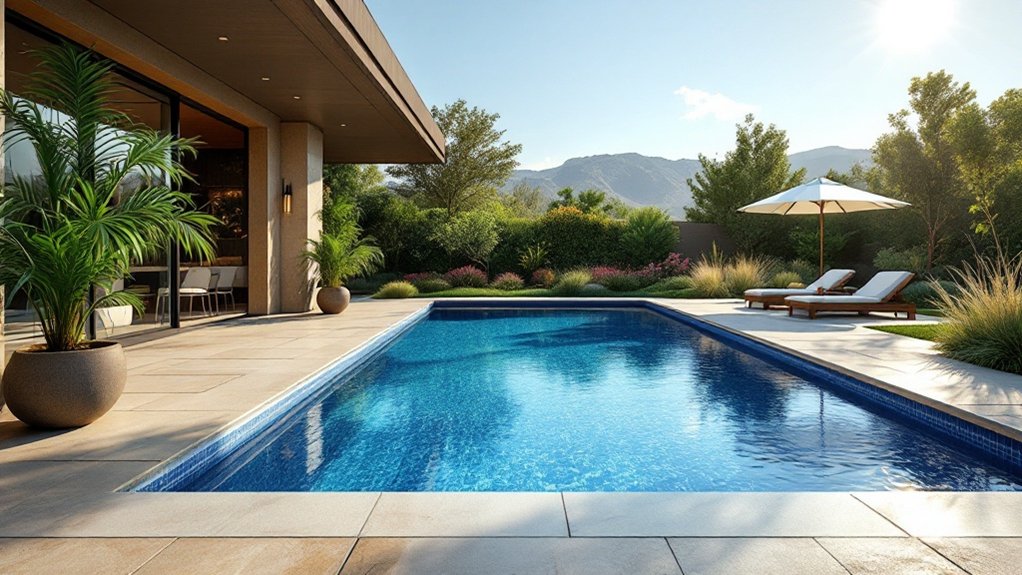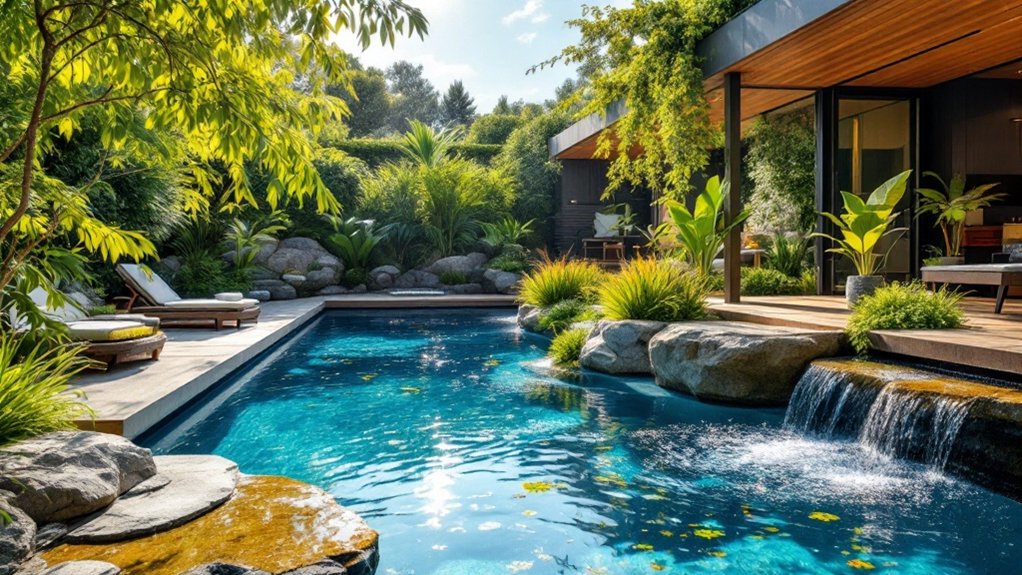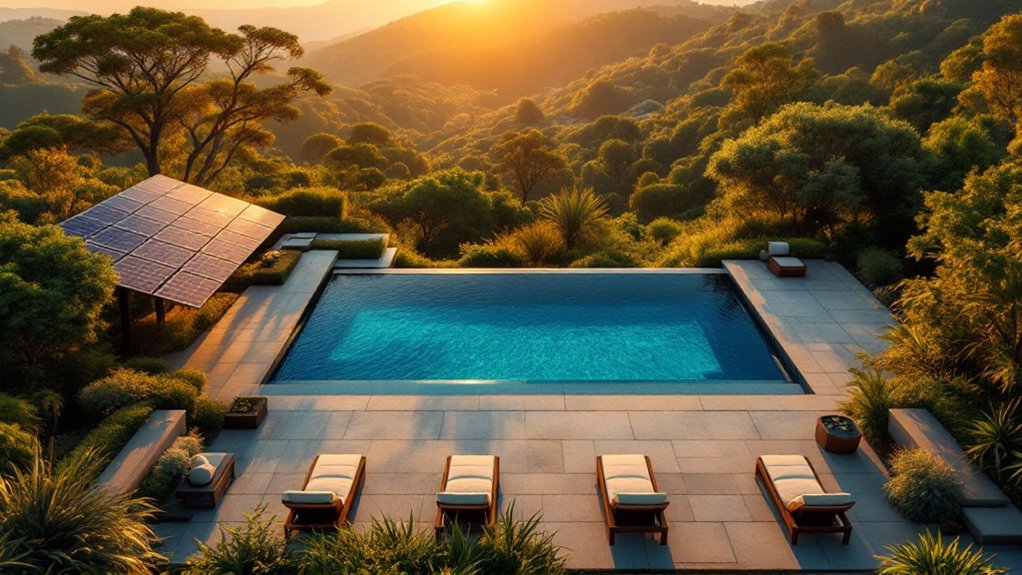Water-saving technologies are reshaping modern pool design by prioritizing sustainability and efficiency. Advanced filtration systems and variable-speed pumps markedly cut water usage while enhancing the pool environment. Rainwater harvesting and innovative materials further reduce maintenance needs and chemical reliance. These advancements promise not only lower utility costs but also a shift towards eco-friendly practices. Yet, the implications of these changes extend beyond mere aesthetics, raising questions about the future of pool ownership and environmental impact.
The Rise of Eco-Friendly Pool Designs
As homeowners increasingly prioritize sustainability, the demand for eco-friendly pool designs has surged. These innovative pools incorporate natural materials and energy-efficient technologies to minimize environmental impact. Features such as natural filtration systems, which utilize plants and gravel, replace traditional chemical methods, promoting cleaner water and reducing chemical usage. Additionally, many designs include solar heating systems and energy-efficient pumps, which lessen energy consumption. Rainwater harvesting systems also enhance sustainability by collecting and storing rain for pool use. Moreover, eco-friendly pools often integrate materials like recycled glass or locally sourced stone, reducing carbon footprints associated with transportation. This shift reflects a broader trend towards sustainable living, where homeowners seek to create beautiful, functional outdoor spaces that align with their environmental values.
Efficient Filtration Systems: Saving Water and Energy
Efficient filtration systems play an essential role in modern pool design by incorporating advanced technologies that minimize water loss. These systems not only reduce the volume of water needed for maintenance but also operate with energy-efficient mechanisms that lower overall costs. As a result, they contribute considerably to sustainable pool management practices. Additionally, regular equipment inspections help ensure that these systems function optimally and maintain water quality.
Advanced Filtration Technologies
While traditional pool filtration systems often consume excessive amounts of water and energy, advanced filtration technologies offer a more sustainable alternative. These systems utilize innovative methods such as multi-stage filtration, which employs several filtration mediums to enhance water clarity and reduce chemical usage. In addition, many advanced systems incorporate automated monitoring and self-cleaning features, allowing for ideal operation without constant manual intervention. By utilizing energy-efficient pumps and variable speed motors, these technologies greatly lower energy consumption compared to conventional systems. Moreover, advanced filtration solutions often extend the lifespan of pool water, thereby reducing the frequency of water replacement. Collectively, these advancements contribute to a more eco-friendly pool environment, emphasizing the importance of sustainability in modern pool design.
Reduced Water Loss
Water loss in swimming pools can be a considerable concern for both maintenance and environmental sustainability. Efficient filtration systems are crucial in addressing this issue, as they minimize water loss through evaporation and backwashing. Modern filtration technologies, such as cartridge filters and high-efficiency sand filters, require less frequent cleaning and therefore reduce the volume of water wasted during maintenance. Additionally, these systems often incorporate advanced designs that enhance water circulation, preventing stagnant areas that can lead to evaporation. By ensuring that water remains clean and clear without excessive replacement, these filtration systems contribute greatly to water conservation efforts in pool design. Ultimately, adopting such technologies allows pool owners to enjoy their facilities while being mindful of water usage.
Energy-Efficient Operations
The implementation of modern filtration systems not only addresses water conservation but also enhances energy efficiency in pool operations. These advanced systems utilize variable-speed pumps, allowing for reduced energy consumption by adjusting flow rates based on the pool’s needs. This capability minimizes unnecessary energy expenditure, aligning with sustainability goals. Additionally, energy-efficient filters require less frequent cleaning, resulting in lower water usage during maintenance. By optimizing filtration cycles, these systems guarantee cleaner water while decreasing operational costs. The integration of solar-powered technologies further promotes eco-friendly practices, contributing to a greener pool environment. Consequently, efficient filtration systems represent a significant advancement in pool design, effectively balancing water conservation with energy efficiency for long-term benefits.
Smart Water Management Tools for Pool Owners
As pool owners increasingly seek efficient ways to manage their resources, smart water management tools have emerged as essential solutions. These technologies enable precise monitoring and control of water usage, greatly reducing waste. Automated systems allow users to schedule water levels, ensuring ideal balance without unnecessary overfilling. Additionally, real-time sensors can detect leaks and alert owners to potential issues, preventing costly damage and excessive water loss. Water quality management tools also play a critical role, enabling pool owners to maintain safe conditions with minimal chemical use, further conserving water. By integrating these advanced technologies, pool owners can enhance their sustainability efforts while enjoying the benefits of a well-maintained pool, ultimately leading to reduced operational costs and environmental impact.
Innovative Pool Materials That Reduce Water Loss
While traditional pool materials often contribute to water loss through evaporation and seepage, innovative options are now available that greatly minimize these issues. For instance, advanced pool liners made from thermoplastic materials feature enhanced sealing properties, reducing seepage considerably. Additionally, reflective coatings are gaining popularity, as they help to lower water temperature and subsequently diminish evaporation rates. Some modern pools utilize insulated walls, which maintain water temperatures while preventing heat loss. Moreover, permeable paving in pool surrounds can absorb excess water, reducing runoff and evaporation. These materials not only enhance the pool’s aesthetic appeal but also contribute to sustainability. By incorporating these innovative options, pool designers and owners can effectively combat water loss while enjoying a beautiful and functional swimming environment.
Rainwater Harvesting: A Sustainable Solution for Pools
Rainwater harvesting presents an effective method for collecting water that can be utilized in pool maintenance. By capturing and storing rainwater, pool owners can markedly reduce their reliance on municipal water supplies. This sustainable approach not only conserves water but also enhances the overall efficiency of pool upkeep.
Efficient Water Collection
Incorporating rainwater harvesting into pool design presents a sustainable approach to water collection that can greatly reduce reliance on municipal water supplies. This system captures rainwater from rooftops and other surfaces, directing it to storage tanks for later use. By utilizing a filtration process, collected rainwater can be treated to meet quality standards for pool filling and maintenance. This method not only conserves potable water but also promotes environmental stewardship by minimizing runoff and reducing the strain on local water resources. The implementation of rainwater harvesting contributes to a more self-sufficient pool ecosystem, allowing homeowners to enjoy their pools while supporting sustainability efforts. Such innovative designs reflect a growing trend towards eco-friendly practices in modern pool construction.
Pool Maintenance Benefits
Utilizing rainwater harvesting systems not only supports sustainable water collection but also offers significant advantages for pool maintenance. By capturing and storing rainwater, pool owners can reduce reliance on municipal water supplies, resulting in lower water bills and a diminished environmental impact. This practice facilitates regular water replenishment, ensuring ideal pool levels while minimizing evaporation losses. In addition, rainwater is typically free of the chemicals present in tap water, reducing the need for additional water treatments and chemicals, which can be costly and harmful to the environment. Additionally, the use of harvested rainwater helps maintain a stable water temperature, enhancing swimmer comfort. Overall, integrating rainwater harvesting into pool maintenance presents a practical approach to sustainability and cost efficiency.
Pool Covers: Enhancing Efficiency and Minimizing Evaporation
Although many pool owners prioritize aesthetics and recreational features, the implementation of pool covers plays an essential role in enhancing energy efficiency and reducing water loss. By providing a barrier between the water surface and the environment, pool covers greatly minimize evaporation, preserving water levels and reducing the need for frequent refilling. Additionally, they help maintain water temperature, lowering heating costs and energy consumption. Various types of covers, such as solar and automatic options, cater to different needs while ensuring convenience. Moreover, the use of pool covers can lead to reduced chemical use, as they limit debris and UV exposure. Ultimately, investing in a quality pool cover fosters a more sustainable and efficient pool environment.
The Long-Term Benefits of Water-Saving Technologies in Pool Maintenance
Adopting water-saving technologies in pool maintenance not only enhances sustainability but also offers significant long-term benefits for pool owners. These innovations, such as efficient filtration systems and automated water level controllers, reduce water consumption and lower utility bills. By minimizing evaporation and water loss, pool owners can maintain ideal water levels, leading to less frequent refills and chemical adjustments. Additionally, the use of advanced monitoring systems enables early detection of leaks, preventing costly repairs and extensive water waste. Over time, these technologies contribute to a healthier pool environment, reducing the need for harsh chemicals, which can damage pool surfaces. Ultimately, embracing water-saving technologies results in a more enjoyable and cost-effective pool ownership experience. Regular pipe cleaning not only maintains optimal water flow but also enhances the effectiveness of these water-saving technologies.
Frequently Asked Questions
How Much Water Can a Pool Cover Save Annually?
The current question regarding pool covers highlights their potential to save significant water annually. Studies indicate that a pool cover can reduce evaporation by up to 90%, leading to savings of thousands of gallons per year.
What Are the Costs Associated With Installing Water-Saving Technologies?
The costs associated with installing water-saving technologies can vary considerably, often ranging from a few hundred to several thousand dollars. Factors influencing expenses include technology type, installation complexity, and existing infrastructure compatibility.
Are Water-Saving Technologies Suitable for All Pool Types?
Water-saving technologies can be suitable for various pool types, including residential and commercial. However, their effectiveness may vary based on the pool’s design, existing infrastructure, and specific water management needs, necessitating careful evaluation before implementation.
How Often Should I Check My Pool for Leaks?
Regular inspections for leaks should occur at least once a month. Additionally, after heavy rains or use, checking more frequently can help identify issues early, ensuring ideal water levels and preventing unnecessary wastage.
Can I Retrofit My Existing Pool With New Water-Saving Technologies?
Retrofitting an existing pool with water-saving technologies is feasible. Homeowners can explore options like efficient filtration systems, automatic covers, and water conservation devices to enhance sustainability while reducing water usage and maintenance costs.
Conclusion
Incorporating water-saving technologies into pool design marks a significant shift toward sustainability and efficiency. As eco-friendly materials, advanced filtration systems, and smart water management tools become standard, pool owners can enjoy reduced utility costs and healthier environments. The integration of rainwater harvesting and effective pool covers further minimizes water loss and evaporation. Ultimately, these innovations not only enhance the longevity of pools but also contribute to a more sustainable future, highlighting the importance of environmental stewardship in recreational spaces.




